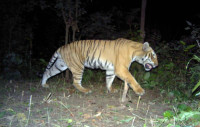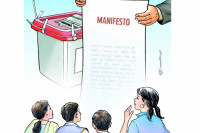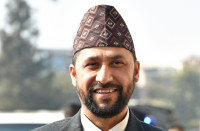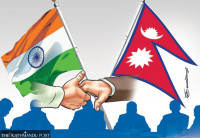National
Parties fail to represent 33 percent women
None of the national political parties has complied with the Election Commission directive to ensure 33 percent representation of women in the central committee.
Sanjeev Giri
None of the national political parties has complied with the Election Commission directive to ensure 33 percent representation of women in the central committee.
The order, in line with the constitution and the Political Party Registration Act, has been flouted, with the parties saying they will be able to comply with the legal provision only after a general convention.
The issue of women’s representation in the central committee came to the fore after the recently unified Nepal Communist Party (NCP) failed to assign roles to women in line with the legal requirement. After initial reservations, the constitutional body finally recognised the NCP in the first week of June.
The same day, a meeting of election commissioners decided to write to all the registered political parties, asking them to ensure 33 percent representation of women in their central committee within a month.
“The parties replied to us that they can only do so through general convention,” Ghanashyam Ojha, deputy attorney at the Political Parties Management Section of the Election Commission, said. Ojha added that the commission has no other option but to wait for the general convention of the political parties as the Act came into force in 2017.
The NCP, which gained legal status after the Act came into effect, told the EC that the new party was formed following a merger between the erstwhile CPN-UML and the CPN (Maoist Centre) which is why they can comply with the rule only after the unity general convention. “The NCP also replied that all its party committees were ad-hoc,” Ojha added.
Only four parties—the NCP, the Nepali Congress, the Rastriya Janata Party-Nepal and the Sanghiya Samajbadi Forum-Nepal—have won enough seats to be called national parties. For the status, a political party has to secure at least one seat under the first-past-the-post system and three percent vote share under proportional representation system.
The NC has 85 members on its Central Working Committee—16 of them women. The NCP has a 441-member Central Committee with 72 women members, which accounts for only 16 percent. Similar is the situation with the RJP-N, formed after a six-party merger in April 2017, having close to 800 members and the Upendra Yadav-led SSF-N.
According to NC leader Rangamati Shahi, the general tendency of men about women that they are incapable to perform has limited their role both within the party organisation and beyond.
She added that there had been some change in recent days with increased access to education and awareness but the popular perception had still been preventing them from showing their actual strength. “Women leaders have performed their duties sincerely. But the growth of women leaders, with some exceptions, remains sluggish,” Shahi said.
While the major forces have failed to comply with the legal provision, a number of fringe parties have abided by the commission’s directive, Ojha said without naming or numbering such parties.
As many as 127 parties have been registered with the EC.




 13.12°C Kathmandu
13.12°C Kathmandu















